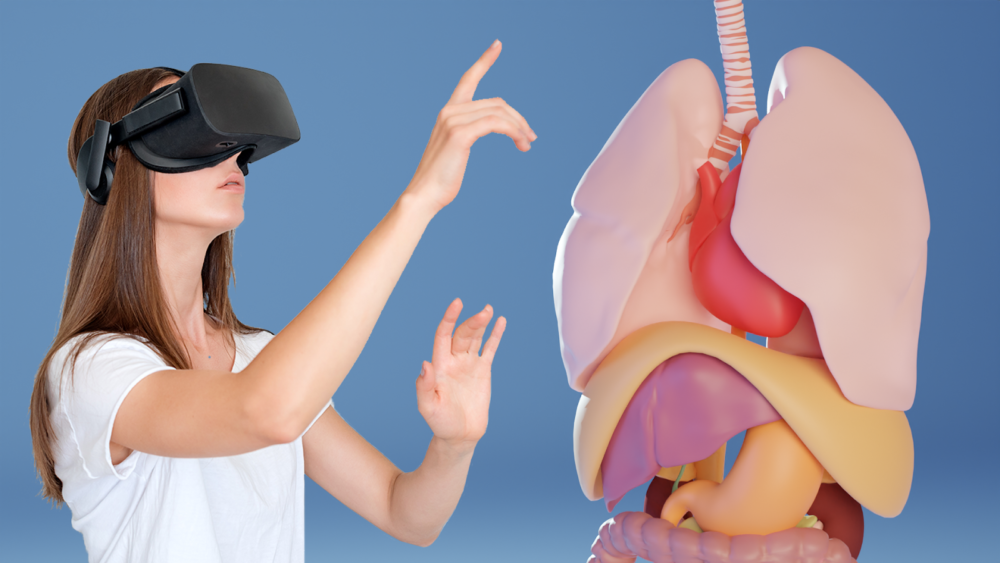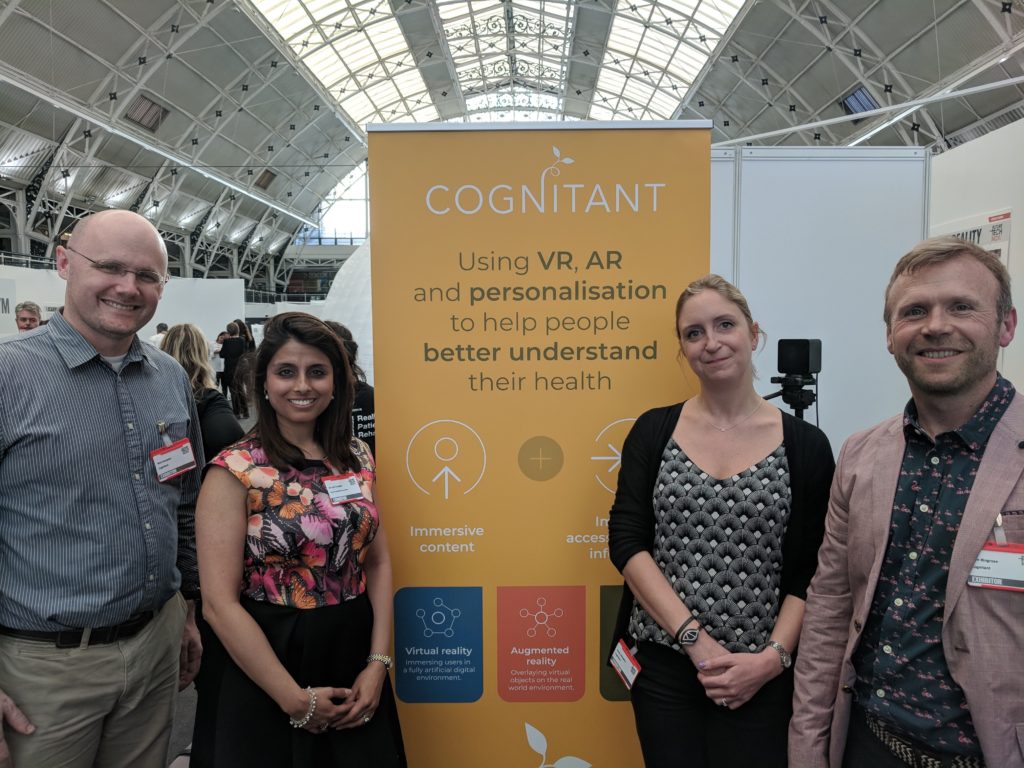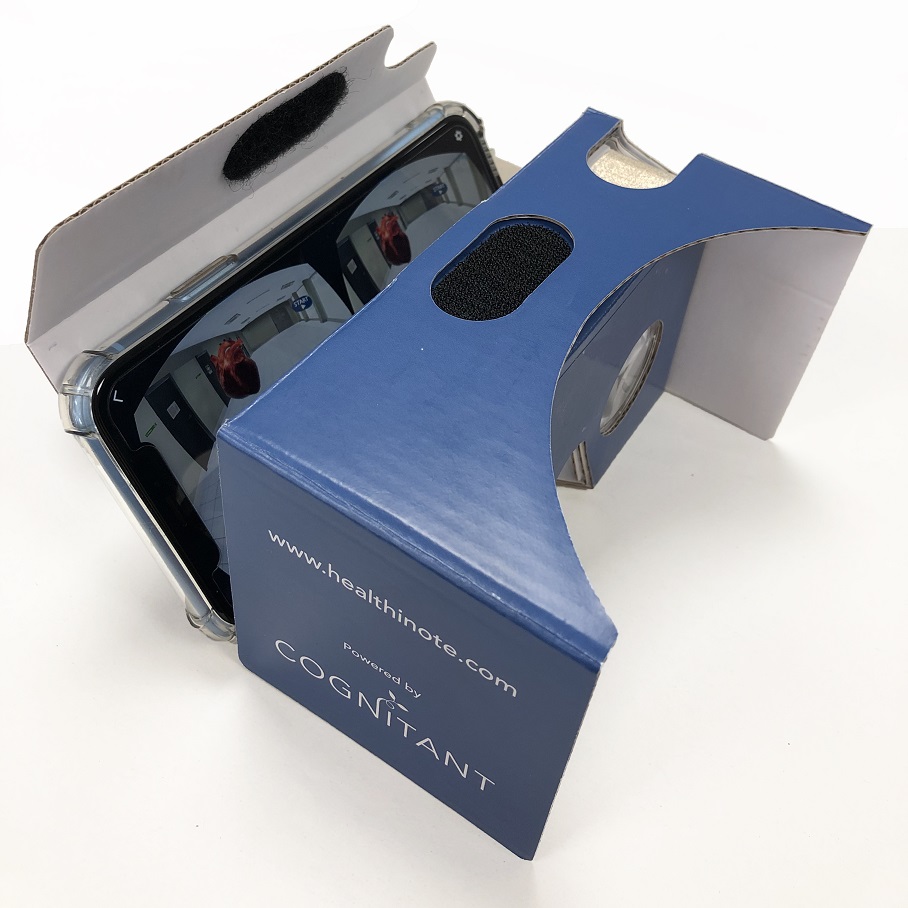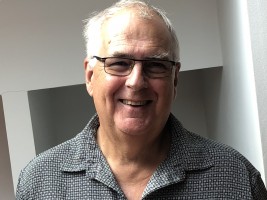
Virtual reality information for patients. Pic: Cognitant
Healthtech start-up calls on virtual reality to help patients ‘be their own specialist’
Much of the NHS’s digital effort focuses on how to improve clinical outcomes and internal processes, and to reduce the burgeoning costs of healthcare within its walls. Oxfordshire start-up Cognitant has looked beyond these parameters, and set its sights on improving the flow of information to patients to save consultation time, improve outcomes, and involve them more in understanding and managing their conditions.
Cognitant is the brainchild of four experienced healthcare professionals (pictured below): chief technology officer Rick Knowles, GP Dr Juhi Tandon, chief operating officer Daisy Allington, and chief executive officer Dr Tim Ringrose, previously a kidney specialist at the John Radcliffe Hospital in Oxford.

Cognitant’s founders L-R: CTO Rick Knowles, Dr Juhi Tandon, COO Daisy Allington and CEO Dr Tim Ringrose. Pic: Cognitant
The company got off the ground in 2018 and has been funded so far by its founders. Ringrose explains: “We founded Cognitant because we had been involved with technology in healthcare,” adding:
“Our focus up to that point had been about providing tools to help health professionals do a better job but we all felt the way healthcare is moving, the patient needs to be their own specialist.”
“How can you provide the public and patients with enough information about their health to make informed decisions and take more control? Rather than just go and see a doctor when you’re unwell – particularly if you have a long-term condition – you understand a bit about your condition and how your treatment works, so you can then manage your own health. We can then stop people having to endure a deterioration in health and hopefully – and this is one of our aims – reduce the load on the health service.”
These aims seem to chime comprehensively with the NHS’s NHSX initiative to drive forward the digital transformation of health and social care. But why develop a separate system when the NHS has already launched its own app?
Ringrose explains that in many consultations there is quite a bit of information that must be passed from doctor to patient and this doesn’t work on paper:
“You’ll often find doctors having to explain basic physiology to a patient; they’ll get a scrap of paper and start drawing. This is where virtual reality (VR) comes in. Visual techniques have so much more capacity to educate people than text. But if you ask people about health information, their experience is usually around printed text, which is a very difficult way to communicate complex information.”
He explains that after a lot of discussion and research, they settled on a digital platform that is smartphone based, mediated by an Android or iPhone app called ‘healthinote.’ The decision to develop an app was based on being able to provide information during consultation and, because the app is developed in Unity, the platform used by games developers, the information can easily be presented visually.
“We can now deliver programs that are clinician-led. The research showed us that doctors, nurses and pharmacists are still the most trusted sources of information. People feel very confused by Google; doctors say ‘whatever you do, don’t Google it’ and patients find it very anxiety-inducing because it gives you the worst possible outcome. And yet, consultation times are getting very short: 10 minutes in general practice, slightly longer in secondary care but still not enough time to be able to give you all the information you need. So we’re trying to give the clinician a tool that helps them provide information to patients in the very limited amount of time available.”
The programs Cognitant has already developed allow health professionals to recommend the content to patients by sending a link or giving a slip of paper with a QR code that takes the patient directly to the relevant content. This simple ‘digital prescription’ can replace the professional’s time repeating a standard speech, as well as providing a more in-depth, visualised set of information that the patient can review at leisure. It is well known that patients, in the stressed environment of a consultation, only take in a small proportion of what is said to them.
Cognitant’s ultimate aim, says Ringrose, is to provide a personalised experience for each patient. This involves some significant steps, including interfacing with patient records and integrating machine learning to provide the relevant content at the right time. Rick Knowles outlined the challenges his team is working on to divide up the content into modules and reassemble them in each situation to provide a coherent narrative.
Taking advantage of the games engine infrastructure, Cognitant’s app provides users with the opportunity to view the content as video-plus-text or as an immersive VR experience. Most current smartphone models support VR content which can be watched using a Google cardboard viewer or, if you have access to one, an Oculus Go headset. An avatar – Cognitant does its own motion capture – explains the causes of a condition and the way the treatment works in a linear narrative with additional information for those who want to know more.

Cognitant’s cardboard VR viewer. Pic supplied
Cognitant’s achievements are getting recognised. The firm was a winner of the Q.health competition run by The Health Foundation. The project they submitted addresses the increase in demand at the kidney disease (nephrology) outpatients clinic at The Royal Berkshire hospital in Reading. This had resulted from a more proactive approach from diagnosing chronic kidney disease, a condition with few early symptoms that can nevertheless have devastating consequences if not detected. Sufferers may end up on dialysis or the waiting list for a kidney transplant. Cognitant is developing content for its healthinote app to give patients more information before they attend the clinic.
Once these patients have had further tests and a treatment regime has been established, this content will vary from patient to patient depending on several factors. The next step will be to develop additional information for each pathway, so that the patient can be informed. Cognitant is waiting for funding to move forward with this.
It’s clear that Cognitant has developed a platform and methodology with applications in a wide variety of areas of healthcare, including mental health. The scope for using the platform in other countries and languages is also evident. The company recently won funding from the government’s Global Challenges Research Fund to carry out a small programme in Columbia. For the first time, Cognitant is starting to talk to potential investors so that it can put in place the resources to embrace these new opportunities.
